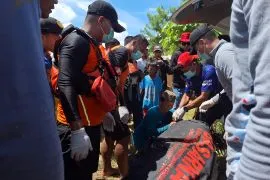Pontianak, W Kalimantan (Antara) - A crocodile, Porosus Crocodilus, was reported to be a by-catch victim after it was found dead in a fisherman's net in Paloh, Sambas district.
"This incident suggests that non-targeted animals caught in the Paloh region are relatively high," said Dwi Suprapti, of the World Wildlife Federation (WWF) Indonesia for Paloh region, here on Saturday.
Based on data from WWF Indonesia, the dead crocodile in Paloh River is the second crocodile to die within the last six months.
The previous incident took place in late 2013 and also involved a local fisherman, Dwi said.
Other animals caught by fishermen include the green turtle, sea turtles, hawksbill sea turtles, leatherback turtles, humpback dolphin, and finless porpoise.
Kalimantan WWF Indonesia Regional Leader Hermayani Putera said that the by-catch phenomenon in Paloh indicates the need for further research on the condition of waters and fisheries in the area.
Also, the government encourages Sambas district to regulate fisheries policies, so fishermen can continue to fish, but ensuring the sustainability of protected wildlife.
The crocodile was reported to be caught in the net of a local fisherman, Rasidin, after he had set the net in waters on the previous night.
Based on the animals caught in the net, the 2.66 meter long crocodile, which weighed more than 100 kilograms, was hunting for food, because there was a half piece of snapper found in the net.
Local tradition of catching crocodiles
For Bugis fishermen like Rasidin, there is a tradition that does not allow crocodiles to be seen, especially in a lifeless condition, because they are still believed to be family members.
Some local residents believe that, in the past, their ancestors saved themselves by pretending to be crocodiles, therefore people are not allowed to kill crocodiles.
If a fisherman accidentally caught a crocodile in a dead state, it must be properly buried, as a family member.
The dead crocodile body is then taken to the fishermen's house to be cleaned and wrapped in white cloth, before being buried in a cemetery. (*)
COPYRIGHT © ANTARA News Jawa Timur 2014
Editor : Tunggul Susilo
COPYRIGHT © ANTARA News Jawa Timur 2014


